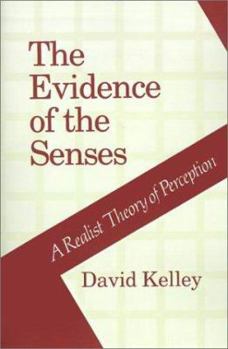The Evidence of the Senses: A Realist Theory of Perception
Select Format
Select Condition 
Book Overview
In this highly original defense of realism, David Kelley argues that perception is the discrimination of objects as entities, that the awareness of these objects is direct, and that perception is a reliable foundation for empirical knowledge. His argument relies on the basic principle of the "primacy of existence," in opposition to Cartesian representationalism and Kantian idealism.
Format:Paperback
Language:English
ISBN:0807114766
ISBN13:9780807114766
Release Date:January 1988
Publisher:Louisiana State University Press
Length:276 Pages
Weight:0.86 lbs.
Dimensions:0.7" x 6.2" x 9.1"
Related Subjects
PhilosophyCustomer Reviews
4 ratings
Interesting, and a clear departure from Rand.
Published by Thriftbooks.com User , 24 years ago
This competently-executed volume was once, briefly, the pride of the Objectivist movement -- a work of genuinely original philosophy along Randian lines, which held out the promise that "Objectivism" might someday win something like academic respectability. I say "was," because its author, David Kelley, was booted out of the movement for being willing to scold libertarians in person rather than just in print.It is no wonder his work came as such good news to Objectivism; it really is a fairly original attempt to develop a realist theory of perception. However, two common misconceptions must be disposed of at once.First of all, Kelley's theory is often described as "direct realism." But as we shall see below, his claim to this title is questionable, and at any rate he does not use it himself.Second, his work is sometimes cited as _the_ "Objectivist theory of perception." It is no such thing.It wants no little legerdemain to extract a coherent doctrine of perception from the hodgepodge of Rand's own writings on epistemology -- and Kelley, to his credit, does not try. Rand is mentioned only twice in the text and twice more in the footnotes; the word "Objectivism" does not even appear in the index. Like Leonard Peikoff in _Objectivism: The Philosophy of Ayn Rand_, Kelley has taken off on his own -- but unlike Peikoff, he does not present his own theories as Rand's.As for those theories themselves, they are at least interesting. Kelley is concerned to reject what he calls the "diaphanous model of perception" -- basically the view that, in order for perception to be veridical, the world "out there" must really _be_ just as we perceive it. This model, he argues, lies at the root of both "representationalism" and "epistemological idealism."In its place he proposes what probably few would deny: that the contents of our experience are the outcome of physico-chemico-bio-psychological causal processes. Taking his lead from Rand, he argues that the fact that experience is caused by such processing does not render it indirect or unreliable. To make this fly, he introduces the notion of a "perceptual form" and argues that, e.g., "coldness" is simply the "form" in which we become _directly_ aware of external temperature (or variations therein).Now, as I noted above, this is clearly _not_ "direct realism" (which Kelley explicitly rejects under the title of "naive realism" as one side of a false dichotomy stemming from the aforementioned "diaphanous model"). While maintaining that consciousness is not "metaphysically active" (i.e. it does not "create" its own contents), he simultaneously holds that it _is_ "epistemologically active" (in "processing" those contents). I do not see that this distinction can be maintained, but at any rate Kelley recognizes, e.g., the color-experience "blue" as a feature of consciousness _rather than_ as a feature of surfaces "out there"; the "form" or mode in which we perceive various reflecta
A valuable book presenting a distinctive view.
Published by Thriftbooks.com User , 25 years ago
Although Kelley gives credit to Ayn Rand where credit is due, he has written the academically respectable and collegial book that she could not. I read this book over a decade ago, and still keep it handy. Kelley's key distinction between object and form provides a remarkably useful tool for analysis of epistemic claims and counter-claims. In fact, it provides a radical reconstruction of basic epistemological categories. One need not adopt Kelley's theory to find his book valuable. I also recommend his article "A Theory of Abstraction" as a useful adjunct to this book. At the same time, is must be recognized that Kelley has not written an introduction to theories of perception or epistemology. Reading this book is no substitute for the later. On the contrary, Kelley's book can be better appreciated with a prior familiarity with more traditional theories of perception. Carefully read, Kelley's book provides a thoughtful counterpoint to the standard theories.
A cogent defense of realism
Published by Thriftbooks.com User , 26 years ago
Kelley is a former associate of Ayn Rand, and in my mind, her true intellectual heir. He's a dry writer, and this won't be a fun read, but everyone needs to understand this defense of realism.
A must read for anyone interested in Epistemology.
Published by Thriftbooks.com User , 27 years ago
Kelley's monograph is an original defense of realism in perception. He argues that perception is the discrimination of objects as entities, that this awareness is direct, and that this perception is a reliable foundation for empirical knowledge. Key to his argument is the distinction between object of perception and form of perception, a distinction not made by many others in the field. Kelley's work considers alternative views fairly, while arguing persuasively for his position. It also suggests a view of concept formation, an area that is all too often not dealt with properly by philosophers, if at all. This book is a must read for anyone interested in the philosophy of perception or epistemology more broadly! Bravo!






